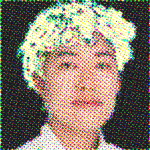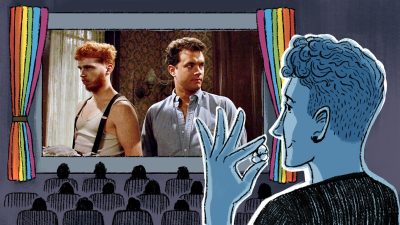Columns Formation Jukebox
A Chinese American Fairy Tale
I love my parents because they are in me, but I wonder if, when they look at me, they see those parts or instead a shapeshifter who’s slowly taken over the person they thought they’d raised.
This is Formation Jukebox , a column by Lio Min on being in transition and the music that helps them make sense of it all.
My mother’s most cutting comment about me is that I have “a big imagination.” This wasn’t a problem when I was a kid: I regularly went all-in on school art projects and could chatter for hours about whatever nonsense I was fixated on at the time. I daydreamed a lot, imagining myself as an Animorph or a rock star or, my most precious wish, a writer whose shelves were filled with their own work. I was a wild kid in the natural sense of “wild,” content to spend hours at the basketball court picking honeysuckle from the fences or holed up at the library, and my parents let me run feral and precocious and fantastic.
Then suddenly, or so it felt, my big imagination had to go. My passion, once free to pool in the impressions left by whatever stones I’d overturned on my own, had to be slipped into a narrow barrel and focused on my future: A target my parents had lovingly prepared, like a bridal dowry, from the moment I was born.
It no longer made sense for me to have free rein over my desires, since none of them manifested as precursors of genius. I wrote a lot of verses, but they never became songs. I wrote a lot of beginnings, but not one ending. And every time I tried to justify my dreams to my parents, they pulled out a mirror and forced me to look at my earnest reflection and account for all of my wishing and wanting. Had any of the time I’d spent reading all those books, experimenting with so many creative forms, daydreaming and wandering, amounted to anything? Didn’t I have a different dream the last time we had this conversation?
They’d always be right; I’d always be wrong for insisting I could change—that this time, the dream would stick, and they’d have to admit that maybe their wayward child could amount to someone they could be proud of after all.
*
I never got into East Asian pop music the way so many kids of my generation—my particular slice of Chinese American middle-class diaspora—did. But I know “童话,” pronounced “Tong Hua” and translated as “Fairy Tale,” the way I know what brand of vermicelli noodles my mother prefers to buy at the Asian grocery; the way I can instantly invoke the smells of Temple of Heaven balm or various mystery green oils or dried mushrooms or chrysanthemum tea; the way I cook variations of my mother’s recipes as she’d cooked variations of her mother’s recipes, passed down by visual and scent memory alone.
“童话” is not a banger. Lyrically and based on the tempo, it is the spiritual opposite of a banger, a syrupy ballad whose music video ticks off the common tropes of Asian dramas—specifically, a playfully bratty girl gets taken down by a sudden illness whose first symptom is a dramatic fainting spell—with an almost mercenary melancholy. 光良 (pronounced Guang Liang), whose English name is Michael Wong, sings like the kind of guy who writes secret long love letters to the popular girls at school who don’t know his name, the nebbish counterpart to more obvious brooding heartthrob hybrids like Jay Chou. “童话” is a song you learn on piano to impress your middle school crush from weekend Chinese school. This is a song that practically vibrates with UWU energy. This is a song so uncool that your parents love it .
And yet, “童话” is an absolute banger. The Chinese lyrics are direct, and poignant in the same way as a willow tree whose leaves brush against the trembling surface of a burbling stream. Filtered through translation, the English lyrics could be captions for brooding screenshots from a Wong Kar-Wai film. There is no subtext to “童话.” The fairy tale in question isn’t about a hero or a journey or a monster to slay, but about convincing someone who’s lost faith in the world to hold on to hope.
The common Chinese phrase for “suffer” is “受苦,” which literally translates to “receive/endure bitterness.” It’s fitting for a culture whose traditional medicines and favored liquor taste generously noxious, whose nationalism is both revolutionary and crushing, whose expansionist vision of and growing power over the future seems more and more likely to define the coming era. In China, as in much of Asia, your life is not just your own. There’s little room for flights of fancy if you carry the weight of your family’s honor. Chinese culture is as rowdy as it is cruel, blazingly warm but just as furiously unyielding. It rewards tradition and responsibility and community and certainty, reflected in educational and professional hierarchies where your potential is calcified.
In the final chorus of “童话,” the lyrics shift from “我愿变成” (“I would become”) to “我会变成” (“I will become”), replete with a key change. 光良 insists his lover can pull through. The final line of the song is “一起写我们的结局”: “We’ll write our ending together.” But the final line of the video is “加油,” delivered by his dying lover: “Go for it,” the kind of thing someone screams at their kid during a race. His lover hasn’t made it, but she bids him and you, the viewer/listener, to keep moving forward. Endure the bitterness, because what else is there?
*
I’ve only seen my parents truly drunk a handful of times. In those moments, they are so nice that it’s actually disarming. My mother becomes giggly and tender, and my father’s humor takes on an absurd dimension. They both touch my hair and wrap their arms around my shoulders. They face me as their creation, and I see them as they might have been before I existed: Back when my father drove through a bunch of the western National Parks, sleeping in his car and wiring himself on Mountain Dew; back when my mother permed her hair and sang in a choir. Now my mother rarely sings in public, but I can summon memories of her in the kitchen preparing dinner, humming under her breath.
My father wanted to be a musician. He “played” everything from the tuba to the violin, and I at least believe him about his brass proficiency: The first time he saw me in my college marching band attire, he took my mellophone out of my hands and played with a clearer tone than I could, his embouchure strong despite decades of non-use. One of my favorite photos is a black and white shot of him with a slick hairdo, wearing giant square glasses, playing a trombone, surrounded by a bunch of other Chinese men wielding instruments.
Actually, scratch that—every photo of my parents from their youth is my favorite photo. Every vestige of their impulsiveness, their strangeness, and their dreams is like torrential rain on a desert plain, renewing my understanding of them in between long droughts of lacking. These are the people from whom I’ve inherited spontaneity, curiosity, and that big imagination. I love science fiction and fantasy and music and art and working with my hands and laughing until I’m crying and fighting over the check and fart jokes and taking long walks and spicy food and strawberry milkshakes and tending plants and being Chinese, because of them. I love my mother’s effortless takedowns and my father’s goofiness as much as I fear her stone-faced judgment and his volcanic anger. I love them because they are in me, but I wonder if, when they look at me, they see those parts or instead a shapeshifter who’s slowly taken over the person they thought they’d raised.
*
When I first bleached my hair, my mother told me I was killing myself, which is fair. When I told my parents I was quitting my first job out of school and going to make a living writing, they warned me that I wouldn’t be welcome home if I couldn’t support myself, which is fair. The last time I was home, my father asked my mother if she’d like to read some of my writing, and without turning to me, she said no, which is fair.
I used to send them clips, but I stopped years ago. I also used to ask them about their lives before me, but I stopped because they never said much, usually sharing a knowing smile as they told me the simplest possible story. As a writer, I crave detail. As their child, I crave approval and understanding. But when I try, as I am now, to write about them, I can only recount all the things they did and almost none of the things they didn’t. All wins, no losses. All sweetness, no bitterness. Our communication lines are crusted over with a similar patina of almost-truths: I tell them I’m taking care of myself, and they tell me what they’re doing day by day. I’ve always learned about big life changes, like my grandmother dying or my father losing his job, after they happened. So now I share my own big life changes with everyone but them.
Of course I still want to make them proud, but the least painful way to do that is to keep a smokescreen up between who I am and who they want me to be. The daughter who keeps her hair long and black, who works somewhere they know in a field they understand, who would’ve worn a red dress at her wedding, still exists in their mind, but she’s a body double I’ve left behind in some metaphorical castle. Then I go into the world and figure myself out without having to fight them at every turn or defend every perceived failure. The irony isn’t lost on me: In every way that matters, I’ve hit their precious target, but without them as witnesses, only the archer watches the arrow fly true.
I’m only a search away, but I know they aren’t seeking the version of me that exists in the world. I’m tempting fate with so many scattered open secrets, leaving them as obvious breadcrumbs if they ever wanted to come after me. They don’t, because they think I walk a path they wish I wouldn’t. But this secrecy was theirs first. Everything was theirs first, and I place my footsteps in their footsteps, and they don’t look back to realize I could only be theirs, I will only ever be theirs.
*
My favorite video of my father is of him, surrounded by his friends, singing karaoke. I never would’ve heard this version live, because I wouldn’t have been let into that space, or else he wouldn’t have picked up the mic and sang like that if I were there. His voice is powerful and sincere, and he grandstands like he’s on the stage at Carnegie Hall. When the key change comes at the end, he leans into it, and my heart booms like a door hit by a battering ram.
The song is “童话,” of course, because this is my essay and it is the only song that puts me and my parents in conversation together. I wonder what my father thought of when he sang it; I wonder what my mother thought of when she recorded his performance. I’d like to believe that they thought of each other, or about our family, or the long distance between their American home and the homes they left to get here, or the fairy tales they read as children.
I’d ask them, but I don’t think they’d tell me. I’d send these words, blood manifested as pixels on a page, but I don’t think they’d read them, or if they did, they’d wish they hadn’t, wondering why I’d waste my time telling their story, or rather, writing around the one they won’t tell me. I don’t have the language for how that feels, but that’s my failure. Maybe it’s like eating something bitter and smiling as it goes down. So, alone, I write the only ending I can.







